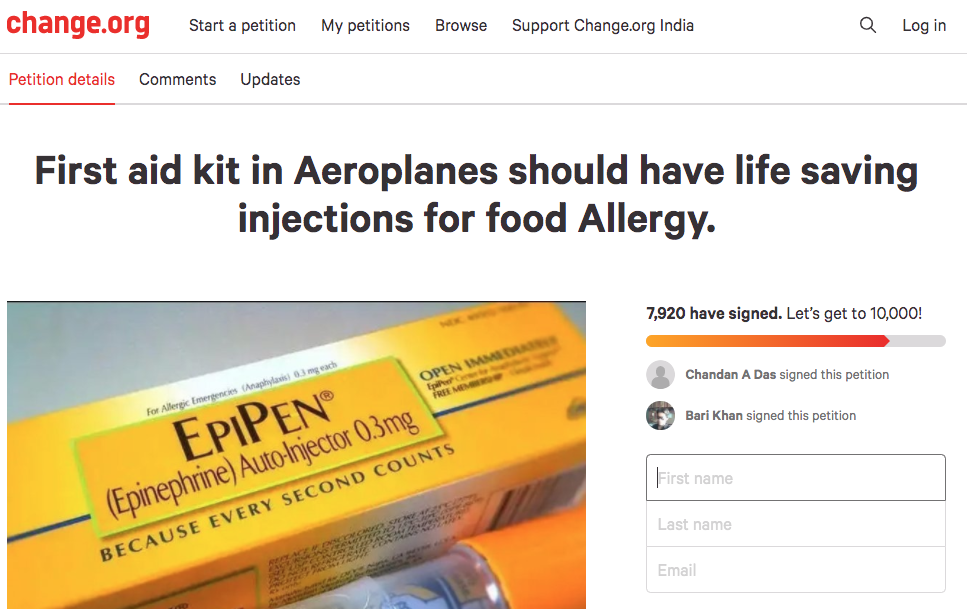
By Anuksha Dey
Indu Sen, an Anaesthesiolgist from Chandigarh, India launched a petition to include an epipen in the first aid kits in aircrafts. Close to 8,000 people have signed the online appeal demanding an injectable allergy medicine that anybody can use to save lives onboard. “If you get an allergic reaction to something you eat on a flight, the staff might not be able to save you, food allergies can be fatal,” says Indu.
Epipens are devices that allow allergy patients to administer their own injections of epinephrine, a life-saving drug. The device is widely used in the US, and the brand has also launched a version of the product for children. Currently, Indian aviation service providers do not have this device in their first aid kits. Instead, they have vials of the drug epinephrine in their medical kit, with syringes. However, the medical kit can only be opened by a doctor or nurse who happens to be on the plane as the cabin crew do not have the level of medical expertise needed to administer such injections. However, EpiPen, an auto injector, simplifies the administration of the drug, and allows non-medical professionals to administer the drug themselves.
Med Aire, a leading international company that provides medical kits to airlines, has stated that it will include Epipens in their kits, acknowledging the importance of the auto injectable devices. However, how feasible is it for domestic airlines in India to add epipens to their kit? Let us find out…
Safety precautions by airlines to tackle allergies
Airlines do not currently provide a 100% allergen-free environment on their domestic flights in India. So far, certain airline companies such as Easy Jet from the UK and Southwest Airlines from the US have banned peanuts on board. However, peanuts are just one food item known to cause allergies. Milk, eggs, tree nuts, shellfish, soy wheat, and fish also trigger allergic reactions. On Indian domestic flights, none of these are banned; and some items are even served by the airlines themselves.
However, airlines such as Indigo and SpiceJet do mention the ingredients of the food on their packages. “Every food item we serve comes with a label for the customer’s safety. The ingredients used are mentioned on this label,” says Shrabony Biswas, an air hostess from SpiceJet. Arpita Sarkar who works at Indigo too says, “We only serve packaged food on planes and each ingredient is mentioned on the package.”
What happens if you get an allergy attack on a flight?
Currently, first-aid kits on planes contain basic medicines, such as medication for heart attack, vomiting, stomach ache, allergy, and fever, along with oral rehydration solutions (ORS) and an inhaler for asthma patients. However, when it comes to allergy medication, the kit only contains cetirizine, a generic, mild, over-the-counter antihistamine that has to be taken orally. While this may work in some cases, it is ineffective in life-threatening situations.
Arpita from Indigo says, “We are trained to give basic medication, first aid, Automated External Defibrillator (AED), and Cardiopulmonary resuscitation (CPR). But if the situation calls for more serious medical attention, we have to call for doctors or nurses on board to attend to the patient.”
Planes also contain a medical kit that the staff is not allowed to open unless requested by a doctor travelling on the plane. The kit contains equipment, such as sphygmomanometer, injectable drugs, and other medicines which only a person from a medical background can use. Currently, injectable epinephrine is not included in the medical kit.
“In extreme situations, the captain makes an emergency landing at the nearest airport,” says Arpita. “The ground staff arranges for an ambulance to be ready, so that the patient can be given immediate medical support.”
How would Epipen help on flights?
Most fatalities due to allergies occur when victims do not have an emergency kit with epinephrine with them, according to research by America’s National Library of Medicine. Whether a patient requires Epinephrine or a simple dose of an over-the-counter anti allergen depends on a person’s history of past attacks, severity, type of attack, and the kind of allergen. The symptoms of anaphylaxis or a life-threatening allergic reaction include itching, redness, and swelling of skin, hives, itching of mouth, swelling of lips and tongue, vomiting, diarrhea, cramps,shortness of breath, wheezing, coughing, chest pain and/or tightness, weak pulse, dizziness, faintness, headache, nasal congestion, watery eyes, sweating, confusion, and loss of consciousness. Anaphylaxis may start with mild symptoms that can quickly accelerate.
“Epinephrine or similar drug must be injected within minutes of the attack or it may prove fatal, antihistamines can be taken orally,” Dr Adersh Gouda, a medical professional told Residents Watch. “But they take time to work, so are not a great help in acute cases.” Therefore, having an Epipen, a device that simplifies the use of Epinephrine, would make air travel safer.
Dr Gouda says some amount of life-saving training is still required to use Epipen, and the staff must be trained for it too. As an Epipen is easy to use, he also recommends teaching patients with records of severe allergy and their family members about ways to use it themselves.
The problem with Epipens
While Epipens would certainly make air travel safer for people with food allergies, they are notoriously expensive. In fact, in 2016, Mylan, a company that sells the device got into the row for overcharging for their products. Moreover, the product has a short lifespan and must be replaced every year.
In 2019, Allergycure.co estimated the cost of an Epipen to be between Rs 2500 to 3500 in India. The device is not manufactured locally and must be imported. Moreover, Mylan, the company that manufactures the drug was denied a license to sell the product in India. Besides, chemists who import and sell the product add their markup to the market price in the US.
A number of wholesalers, chemists, and research labs in Mumbai, Bengaluru and Hyderabad claim to sell the product online. However, we were unable to reach them on the numbers provided. “Epipens are mostly unavailable in India while the drug Epinephrine may easily be found anywhere in India, says chemist Murai Mohan Ghosh.
Practicality remains a primary concern in making Epipens, a part of a plane’s first aid kit.




